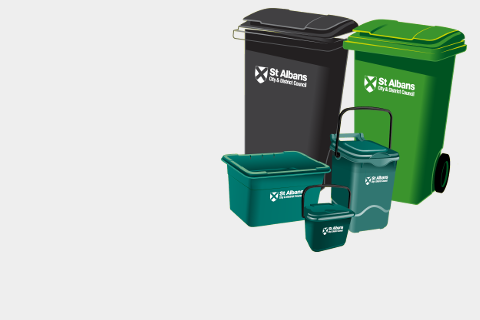About my bins
In this section you can find out about your bins, boxes and bags and what to put in them.
About your bins (boxes and bags)
You can also check what you can put in your bins by entering your postcode in the Recycle Now search tool.
You can find out all about what you can put in which bin in our St Albans Recycling leaflet
What goes in which bin and how often is it collected?
Brown wheeled bin /Purple refuse sacks (up to 3 sacks per fortnight) Toggle accordion
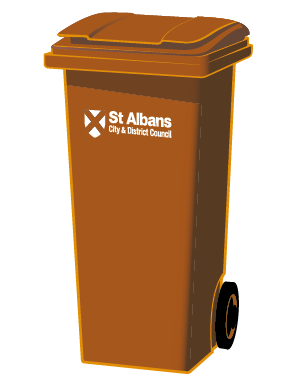 Those properties not suitable for wheeled bins are issued with purple refuse sacks. The sacks are delivered twice a year.
Those properties not suitable for wheeled bins are issued with purple refuse sacks. The sacks are delivered twice a year.
Only waste fully contained within your brown bin (lid closed) will be collected, excess waste will not be taken.
What goes in it?
Household waste that cannot be recycled
What doesn't go in it?
- Extra bags left by the side of the bin
- Rubble - DIY waste
- Paint
- Electrical items and batteries
- Furniture and soft furnishings
- Garden waste
How often is it collected?
Fortnightly – on alternate weeks to household recycling
Black wheeled bin Toggle accordion
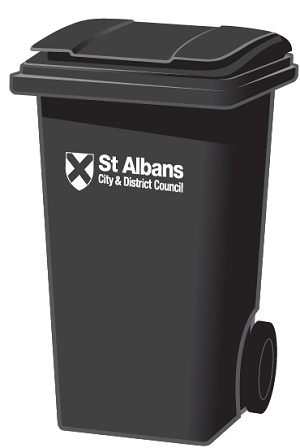 What goes in it?
What goes in it?
- All plastic bottles, trays, pots and tubs
- Fruit punnets
- Food and drinks cans and tins
- All empty aerosols
- Clean Kitchen foil
- All glass bottles and jars
- Shampoo bottles
What doesn't go in it?
- Light bulbs
- Spectacles
- Plate glass
- Pyrex glass
- Drinking glasses
- Plastic bags
- Cellophane
- Polystyrene
- Film wrapping
- Mirrors and crockery
How often is it collected?
Fortnightly – on alternate weeks to household waste
Black / Green box Toggle accordion
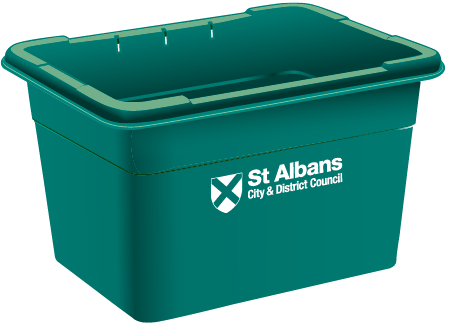 What goes in it?
What goes in it?
- Cardboard packaging and flattened boxes (large boxes need to be cut down to a manageable size)
- Greetings cards (plain)
- Shredded paper
- Newspapers and magazines
- Junk mail, leaflets and brochures (remove plastic packaging)
- Envelopes (including window)
- Catalogues and directories
- Paperback books
- Cardboard packaging (broken down to manageable size)
- Toilet roll and kitchen roll tubes
- Cereal boxes
What doesn't go in it?
- Carrier bags
- Greasy, waxed or shiny wrapping paper
- Tetra Pak cartons (take to recycling area at waitrose)
- Dirty, greasy takeaway pizza boxes
- Polystyrene/insulating packaging (especially from meal prep boxes such as Hello Fresh and Gusto)
How often is it collected?
Fortnightly – on alternate weeks to household waste
Green wheeled bin - opt-in paid subscription service Toggle accordion
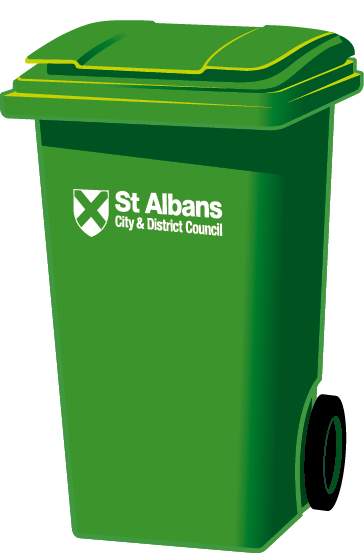 This is an opt-in paid subscription service. Find details and how to sign up here
This is an opt-in paid subscription service. Find details and how to sign up here
What goes in it?
- Grass cuttings, leaves and weeds
- Tree, shrub and rose prunings
- Small branches up to 150mm/6” diameter
- Cut flowers
What doesn't go in it?
- Soil, stones and turf
- Hardcore
- Treated timber
- Paper and card
- Food waste
- Plastic flower pots and trays
How often is it collected?
Fortnightly – on alternate weeks to household waste, except for the 2 weeks over Christmas and New Year when the service is paused.
If you would like us to take bins/bags away, as you do not wish to subscribe to the service please contact Veolia on 01727 809019 to arrange this.
Small green caddy Toggle accordion
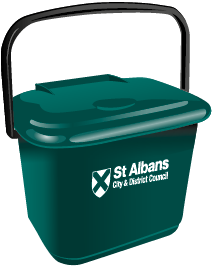 What goes in it?
What goes in it?
- Fruit and veg peel
- Meat and bones
- Coffee grounds
- Tea bags
- Cheese
- Raw food
- Bread and pastries
- Plate scrapings and leftovers
- Fish
- Egg shells
What doesn't go in it?
- Liquids
- Plastic (including black bags) other than carrier bags used as caddy liners
- Flowers
How often is it collected?
Weekly
Plastic bags (not provided) Toggle accordion
What goes in it?
Either small electricals:
- Batteries
- Toasters
- Hairdryers and straighteners
- Mobile phones
- Digiboxes
- Irons
- Kettles
Or Textiles:
- Worn or torn clothing
- Handbags
- Pillowcases or sheets
- Paired shoes
What doesn't go in it?
- TVs
- Computers
- Washing machines
- Light bulbs
- Duvets
- Pillows
- Cushions
- Rugs, mats and carpets
- Rubbish
How often is it collected?
Weekly, please ensure the two types of items listed above are bagged separately and placed next to your bin on collection day. Do not use black bags.
How to order a replacement Bin, Caddy or Bag Toggle accordion
You can order replacement bins by calling Veolia on 01727 809019.
Please take care of your wheelie bins, for example by marking it with your house number and street name. Please also remember to retrieve it as soon as possible after collection. This is important because replacements will need to be purchased.
Replacement -
- wheeled bins - £45 each
- garden waste bags - £15 each
- boxes/lids - £10 each
- lids for boxes - £3.00 each
- caddies - £10 each.
Don’t know what to do with a waste item? Toggle accordion
Visit Recycle Now’s A-Z of what to do with my waste
Too much for your bins? Toggle accordion
All residents are responsible for what happens to their waste, even if it has left the premises. Keep waste to a minimum by doing everything you reasonably can to prevent, reuse, recycle or recover waste (in that order)
There are various methods for disposing of waste;
Reuse centres
Reuse centres are an easy place to donate unwanted household items or pick up an amazing bargain.
Bulky items collection
We can collect your larger items that can’t be collected as part of the normal kerbside service. Please note we charge for this service. Visit our bulky waste collection page for details
Household waste recycling centres (local tips)
For locations opening times and accepted materials please use the Recycling Centres
Recycling Locator
Find local recycling facilities in your area
Don't leave it outside of your house for scrap metal collectors - this is illegal and classed as fly tipping. Leaving it on the street or by a litter bin is also classed as fly tipping.
Reduce your waste – switch to ‘real nappies’ Toggle accordion
We've teamed up with a host of nappy suppliers to offer Hertfordshire residents an exclusive 15% discount off a huge range of reusable nappies, accessories and other eco-living products. We also have loads of advice to help you find the best nappies for your baby.
Full details of the new scheme are at Herts Reusable Nappies.
Live in a flat?
If you are in a flat you can still recycle the same materials as houses, but you will have communal bins instead. We do not collect garden waste. If you have communal gardens, this waste should be taken away by the contractor maintaining the area.
This information is for flats in blocks
- Recycling bins - collected every two week- no limit on the number of bins
- Landfill bins - collected every week – 90 litres per property.
- Food Waste - collected every week
If there are any issues with the bins or bin store area please contact your managing agent or landlord. Alternatively, contact wastemanagementofficers@stalbans.gov.uk and provide details for your managing agent or landlord.
Managing Agents and Landlords Toggle accordion
Each block of flats may have different combinations of bin types as every block of flats is different. All residents living in flats should be provided with a recycling and refuse collection.
Managing Agent and Landlord responsibilities
As a managing agent or landlord you are responsible for ensuring:
- the bins are clean
- the bins are accessible
- the removal of excess waste not contained within the bins
- contaminated bins are emptied (either via the council’s contractor or private arrangement)
- residents know how to use the waste and recycling service correctly understanding the reasons why a bin has not been emptied.
- understand your duty of care
Use any of the following to help your residents use the right bins for their waste:
- Download our recycling leaflet
- Request recycling posters and stickers from us wastemanagementofficers@stalbans.gov.uk
- Include the link to our recycling pages in correspondence with your residents
- Download template letters about contaminated recycling bins and the new resident’s letter
- Ensure residents have your details and are able to contact you with issues about their bins and bin stores
- Ensure missed bins are reported within 48 hours of the collection day
For further advice please contact wastemanagementofficers@stalbans.gov.uk .
Contaminated bins Toggle accordion
We will only collect recycling bins containing the correct materials, bins containing items that can't be recycled will not be emptied.
It is the responsibility of managing agents and landlords to arrange for contaminated recycling bins to be emptied - this can be arranged with Veolia (see below costs) or independently through a registered waste operator.
Prices for emptying contaminated recycling bins | |
Description | Cost |
1100 & 660 litre contaminated recycling bin empty charge | £167 |
240 litre contaminated recycling bin empty charge | £70 |
Please contact Veolia (01727 809019) to arrange for them to return to empty your contaminated recycling bin and to pay.
Why don't we take extra rubbish? Toggle accordion
Households have 90 ltrs of landfill waste capacity per week. We are committed to reducing the waste we send for disposal and increasing what we recycle. The best way to do this is through encouraging residents to make use of the recycling and food waste bins and by signing up to the chargeable garden waste service or home composting.
Over 60% of household waste is recyclable so there should be no need to create extra rubbish. Recycling is also the most cost effective route for disposal for the tax payer.
Household Duty of Care Toggle accordion
Alternatively, you may decide to employ an individual or a company to take your waste away from your property. Always remember that you have what the legislation calls a 'duty of care'. Duty of care means that you must take reasonable steps to ensure that people removing waste from your premises are authorised to do so.
These reasonable steps are:
1. Check their waste carrier licence
If you transfer your waste using a waste removal company, you should take reasonable steps to ensure that they are a registered waste carrier. You should always ask for their waste carrier licence number and check whether it is a valid one by contacting the Environment Agency on 08708 506 506. Please check if the removal company has a relevant waste carriers licence.
2. Obtain a waste transfer note
Please refer to the governments advice for disposal of business waste
Remember - your waste is your responsibility.

